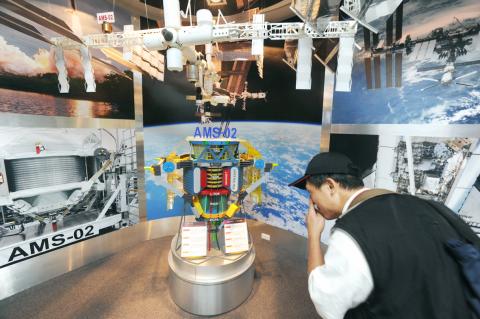The establishment of a Taiwan-based ground control center for an advanced particle physics detector in space is a win-win development, President Ma Ying-jeou (馬英九) said yesterday at the formal opening of the facility. A new generation of researchers can be trained, while Taiwanese scientists continue to contribute to the Alpha Magnetic Spectrometer-02 (AMS-02) project that is key to the future of the human race, Ma said.
The Payload Operations Control Center located in Taiwan, one of only two in the world, began operations on Sunday to help monitor the particle physics detector in space. The device is designed to detect charged particles in cosmic rays to find anti-matter and dark matter in the hope of answering questions about the “big bang” and the formation of the universe.
The military-run Chung-shan Institute of Science and Technology in Taoyuan County, where the center is located, has sent six experts to the US and Switzerland for training, while the Ministry of National Defense has also trained a batch of servicemen to participate in the program, the president said. In the future, other young scientists who are interested in the field would be recruited to the project, Ma said.

Photo: AFP
The AMS project, headquartered at the European Organization for Nuclear Research in Geneva, cost about US$100 billion. Ma said no single country can afford to shoulder that kind of price tag, but the research could become the basis for many fields of applied sciences in a few decades.
“It’s not being done for immediate benefit, but for future generations,” Ma said.
In order for the human race to advance, these types of scientific achievements must be passed on to coming generations, he said.
The AMS-02 project was launched by the US Department of Energy in 1999 in collaboration with 15 other countries, including Taiwan. It is scheduled to run for 15 years.

Taiwanese can file complaints with the Tourism Administration to report travel agencies if their activities caused termination of a person’s citizenship, Mainland Affairs Council Minister Chiu Chui-cheng (邱垂正) said yesterday, after a podcaster highlighted a case in which a person’s citizenship was canceled for receiving a single-use Chinese passport to enter Russia. The council is aware of incidents in which people who signed up through Chinese travel agencies for tours of Russia were told they could obtain Russian visas and fast-track border clearance, Chiu told reporters on the sidelines of an event in Taipei. However, the travel agencies actually applied

Japanese footwear brand Onitsuka Tiger today issued a public apology and said it has suspended an employee amid allegations that the staff member discriminated against a Vietnamese customer at its Taipei 101 store. Posting on the social media platform Threads yesterday, a user said that an employee at the store said that “those shoes are very expensive” when her friend, who is a migrant worker from Vietnam, asked for assistance. The employee then ignored her until she asked again, to which she replied: "We don't have a size 37." The post had amassed nearly 26,000 likes and 916 comments as of this

New measures aimed at making Taiwan more attractive to foreign professionals came into effect this month, the National Development Council said yesterday. Among the changes, international students at Taiwanese universities would be able to work in Taiwan without a work permit in the two years after they graduate, explainer materials provided by the council said. In addition, foreign nationals who graduated from one of the world’s top 200 universities within the past five years can also apply for a two-year open work permit. Previously, those graduates would have needed to apply for a work permit using point-based criteria or have a Taiwanese company

The Shilin District Prosecutors’ Office yesterday indicted two Taiwanese and issued a wanted notice for Pete Liu (劉作虎), founder of Shenzhen-based smartphone manufacturer OnePlus Technology Co (萬普拉斯科技), for allegedly contravening the Act Governing Relations Between the People of the Taiwan Area and the Mainland Area (臺灣地區與大陸地區人民關係條例) by poaching 70 engineers in Taiwan. Liu allegedly traveled to Taiwan at the end of 2014 and met with a Taiwanese man surnamed Lin (林) to discuss establishing a mobile software research and development (R&D) team in Taiwan, prosecutors said. Without approval from the government, Lin, following Liu’s instructions, recruited more than 70 software